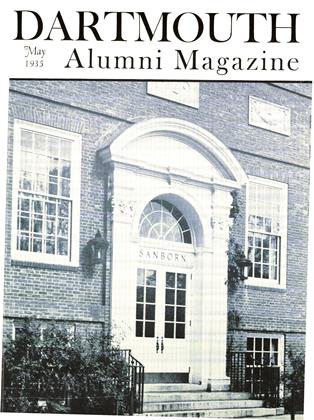The field in which the radicals have stirred up the most response and done some really creditable work is the field of peace promotion. But here they have clouded the issue and neglected the opportunity to get out in front of the whole undergraduate body by waging their campaign along partisan lines. Some 900 undergraduates turned out on April 12 for the mass meeting in Webster Hall, Dartmouth's part in the International Student Anti-War Strike. Contrary to the belief of the skeptics, most of these men were not there just to join in the excitement. They were definitely and sincerely interested in the cause of peace, and they went to the meeting to hear a denunciation of warwar in all its forms. Instead they heard a denunciation of capitalism, and incidentally the war which it breeds. Most of them filed out disgusted and disillusioned.
An interesting phase of Dartmouth life in the past month'has been a sudden spurt of creative energy in the field of writing. Samuel F. Morse '36, of Danvers, Mass., had five poems published in the March issue of College Verse. A humorous article by Robert A. Sellmer '35, of Milwaukee, retired Managing Editor of Jack-o-Lantern, was published in the April issue of Life. Two short stories by Budd W. Schulberg '36, of Los Angeles, Editor-in-Chief of The Dartmouth, and one by George E. Cole '36, of Winnetka, Ill., were selected as Dartmouth entries in the College Short Story Contest sponsored by Story Maga- zine. Harold J. Kennedy '35, of Holyoke, Mass., sold a play he wrote to Samuel French and Co., and it will be published soon. And in late May the Dartmouth Players will produce a two-act musical satire, "Banned in Boston" by Maurice Rapf '35. of Los Angeles, and Budd Schulberg, with lyrics by Paul M. Siskind '35 of Lawrence, Mass. This will be the first show written by students to be presented in Hanover since 1931.
 View Full Issue
View Full Issue
More From This Issue
-
 Article
ArticleHANOVER BROWSING
May 1935 By Herbert F. West '22 -
 Article
ArticleHANOVER SUBMERGED
May 1935 By Richard J. Lougee '27 -
 Class Notes
Class NotesClass of 1918
May 1935 By Allan C. Gottschaldt -
 Class Notes
Class NotesClass of 1930
May 1935 By Albert I. Dickerson -
 Class Notes
Class NotesClass of 1904
May 1935 By David S. Austin, II -
 Class Notes
Class NotesClass of 1905
May 1935 By Arthur E. McClary
W. J. Minsch Jr. '36
-
 Article
ArticleHAS HUMOROUS SIDE
May 1935 By W. J. Minsch Jr. '36 -
 Article
ArticleSENIOR PREFERENCES
June 1935 By W. J. Minsch Jr. '36 -
 Article
ArticleDartmouth—14, Yale—6.
December 1935 By W. J. Minsch Jr. '36 -
 Article
ArticlePLAYERS TAKE PALM
January 1936 By W. J. Minsch Jr. '36 -
 Article
ArticleLENDING NEIGHBORS A HAND
January 1936 By W. J. Minsch Jr. '36 -
 Article
ArticleSNOW ARTISTS
March 1936 By W. J. Minsch Jr. '36
Article
-
 Article
ArticleTUCK SCHOOL AWARDS DEGREES TO THIRTY-TWO MEN
June 1925 -
 Article
ArticleArmy Medics Disbanded
January 1945 -
 Article
ArticleDartmouth Awards Honorary Degrees to Ten
July 1950 -
 Article
ArticleGive a Rouse for –
September 1975 -
 Article
ArticleHardy Entrepreneur Survives Hard Times in Hardware
APRIL 1984 By Doug Tifft -
 Article
ArticleWith the D.O.C.
December 1942 By Warren E. Preece '43

